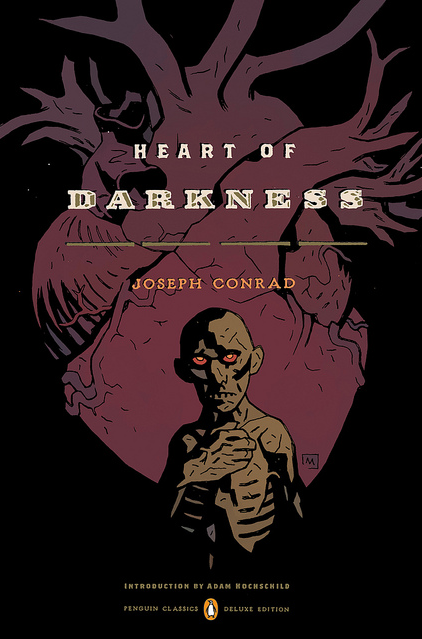Our book group choice for September 2006 is Heart of Darkness by Joseph Conrad. Dark allegory describes the narrator’s journey up the Congo River and his meeting with, and fascination by, Mr. Kurtz, a mysterious personage who dominates the unruly inhabitants of the region.
Heart of Darkness is a novella by Joseph Conrad that was first published in 1899. The novella tells the story of Charles Marlow, a sailor who travels up the Congo River in Africa to find the mysterious ivory trader Kurtz. Along the way, Marlow encounters the brutality of colonialism and the dark side of human nature.
The novella begins with Marlow telling his story to a group of fellow sailors on a boat on the River Thames. Marlow begins by describing his journey to Africa, where he was appointed captain of a river steamer by the Company, a Belgian trading company. Marlow’s journey up the Congo is a journey into the heart of darkness, both literal and metaphorical.
The literal darkness of the Congo jungle is a symbol of the moral darkness that Marlow encounters. The Company’s stations are run with a brutal efficiency, and the native inhabitants are treated as little more than slaves. Marlow witnesses the Company’s agents beating and torturing the natives, and he sees the effects of the Company’s policies on the native population.
The metaphorical darkness of the heart of darkness is a symbol of the evil that exists in the human heart. Marlow meets Kurtz, a brilliant ivory trader who has become corrupted by his power. Kurtz has become a god to the natives, and he revels in his own power. Marlow realizes that Kurtz is a monster, but he is also fascinated by him.
Marlow’s journey up the Congo is a journey of self-discovery. He comes to realize that the darkness of the heart of darkness is not something that is external to him, but something that is within him as well. Marlow must confront his own darkness in order to find redemption.
Heart of Darkness is a powerful indictment of colonialism and the dark side of human nature. The novella is also a complex and multilayered work of art that explores themes of good and evil, civilization and savagery, and the nature of reality.
Discussion Questions
- Why is Marlowe telling us this story? What does he want to get out of it?
Does Marlowe’s curiosity have a price? - What is madness like in Heart of Darkness? What brings it on? Is it innate, or does the environment bring it on?
- What do obsession and ambition have to do with the story? What are some specific examples of certain characters being obsessed with something or having too much ambition? What consequences does it have?
- Is Chinua Achebe right? Is Heart of Darkness racist? Does the book present a simple and degrading view of the native Africans? Or are the views of race more complex?
- How does Conrad depict Africans as different from Europeans? Does this characterization degrade them?
- How does Conrad complicate the idea of colonization being “good”? What kind of negative effects does it have on both white men and the black men of Africa? Who suffers more?
- What is Kurtz passing judgment upon when he voices his famous last words: “The horror! The horror!”? What’s so horrible?
- Much of our information of Kurtz comes secondhand or through the grapevine. How does that affect our vision of him when we finally see him in person? Does Kurtz live up to our expectations?
- Consider the accountant, the manager, and the brickmaker—all puppets of the Company. What negative concepts or themes might each one represent? How are they different from one another?
- What is the effect of the narrative being told by Marlow first-hand? What is the effect of having this narration as a frame story told by the nameless narrator?
- What’s going on with the names—or lack of names? The only names we get are “Marlow” and “Kurtz.” Everyone else is defined by their occupation, a physical description, or their relation to a named character. Does this demean their importance? Does it level the statuses of white and black individuals?

